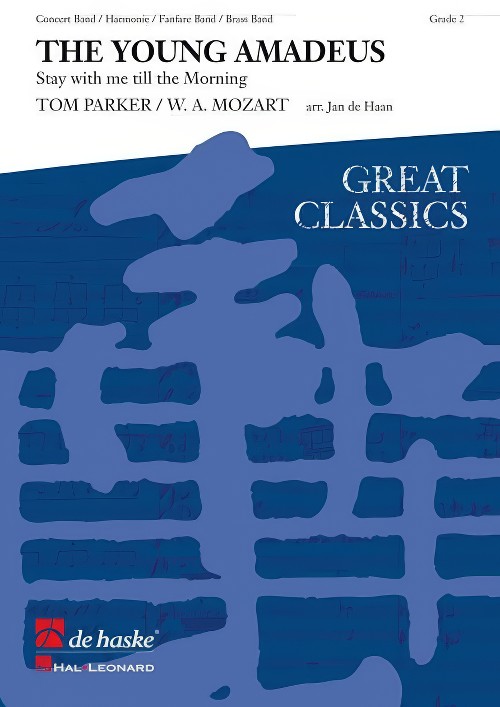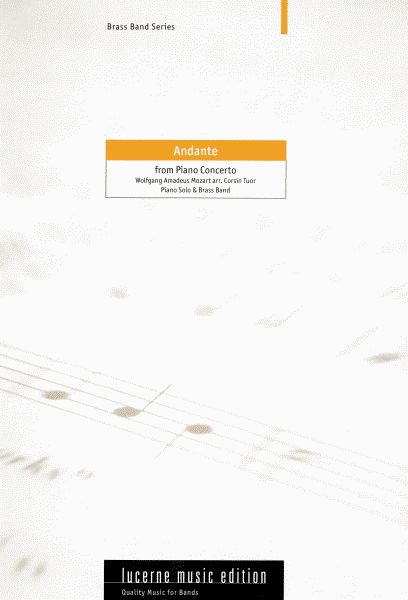Results
-
 £54.99
£54.99The Young Amadeus (Brass Band - Score and Parts) - Mozart, Wolfgang Amadeus - De Haan, Jan
Based on the famous melody from the Adagio movement of the Clarinet Concerto by Wolfgang Amadeus Mozart, this work has a beautiful lyrical quality to it. Compositions of this nature require the ability to play with great expression. The wonderful talent and genius of Mozart is clearly perceptible in this unforgettable melody.Duration: 3:30
Estimated dispatch 7-14 working days
-
 £50.90
£50.90CHANTS RUSSES (Euphonium/Brass Band) - Lalo, Edouard - Ruedi, Thomas
Lento from Violin Concerto Op.29. Grade: Easy/Medium.
Estimated dispatch 7-14 working days
-
 £89.95
£89.95Tuba Concerto (Score and Parts)
This work was commissioned by the Besses o' th' Barn Band with funds provided by the Arts Council of Great Britain. It was written for, and is dedicated to, John Fletcher, who gave the first performance in Middleton Civic Hall, near Manchester, on 24 April, 1976, with Besses o' th' Barn Band conducted by the composer. Another interesting feature about the premire was that it was recorded by BBC Television for an Omnibus programme with Andr Previn as presenter. The concerto exists in three versions: with brass band (1976), orchestra (1978) and wind band (1984).The concerto is in three movements, following the usual, quick-slow-quick pattern: Allegro deciso,Lento e mesto, Allegro giocoso. The first movement has a sonata form shell with two contrasting themes, the first one being rhythmic in character, the second lyrical. There is a reference made in passing to the Vaughan Williams Tuba Concerto, but this merges into the other material in the development section.The second movement begins with a chorale, but after the entry of the tuba it leads to a cantabile theme, softly unfolded by the soloist. The opening chorale passage returns, this time briefly on muted brass, and leads to a middle section which is more chromatic in style and soon builds to a powerful climax, where the opening cantabile theme triumphantly returns. The music subsides, returning to the opening chorale and ending peacefully.The finale is light and breezy in style, and is cast in rondo form. After a brief introduction the tuba announces the main rondo theme, which is dance-like and a little jaunty. There are two episodes: the first a broad sweeping tune, the second a slowish waltz and a little jazz-like. After a virtuoso cadenza reference is made to the very opening of the concerto before the work ends with a triumphal flourish.The Tuba Concerto has established itself as one of the main works in the solo tuba repertoire. It has been performed and broadcast in over 40 countries all over the world. There are currently six commercial recordings of the concerto in its various versions.resolution in C major, pointed by a simple but expansive melody towards which the piece has been heading, and ending in a blaze of joyful colour.
Estimated dispatch 7-14 working days
-
 £17.50
£17.50Andante from Piano Concerto (Score Only)
The 2nd movement from Mozart's Piano Concerto 21 has been skillfully arranged as a piano solo with brass band by Corsin Tuor. This movement featured in the 1967 Swedish film Elvira Madigan.
Estimated dispatch 7-14 working days
-
 £52.50
£52.50Andante from Piano Concerto KV 467
The 2nd movement from Mozart's Piano Concerto 21 has been skillfully arranged as a piano solo with brass band by Corsin Tuor. This movement featured in the 1967 Swedish film Elvira Madigan.
Estimated dispatch 7-14 working days
-
 £104.95
£104.95Concerto for Brass Band and Brass Quintet (Brass Band - Score and Parts)
Estimated dispatch 7-14 working days
-
 £59.95
£59.95Concerto Grosso (For Bb Cornet, Eb Horn, Trombone, Euphonium and Brass Band)
Estimated dispatch 7-14 working days
-
 £89.95
£89.95Concerto No. 1 (1999 Edition) (Brass Band - Score and Parts)
Estimated dispatch 7-14 working days
-
 £104.95
£104.95Concerto No. 2 (Brass Band - Score and Parts)
Estimated dispatch 7-14 working days
-
 £129.95
£129.95Trombone Concerto (Brass Band - Score and Parts)
Estimated dispatch 7-14 working days
